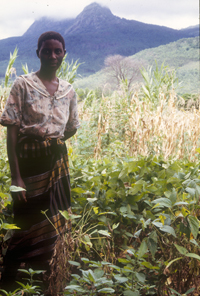 CIMMYT has entered into a collaborative research program to increase household and regional food security and incomes, as well as economic development, in eastern and southern Africa, through improved productivity from more resilient and sustainable maize-legume farming systems. Known as “Sustainable intensification of maize-legume cropping systems for food security in eastern and southern Africa” (SIMLESA), the program aims to increase productivity by 30% and reduce downside risk by 30% within a decade for at least 0.5 million farm households in those countries, with spill-over benefits throughout the region. In addition to CIMMYT, the program involves the Australian Centre for International Agricultural Research (ACIAR), the Association for Strengthening Agricultural Research in Eastern and Central Africa (ASARECA), the national agricultural research systems of Ethiopia, Kenya, Malawi, Mozambique, and Tanzania, as well as the International Center for Research for the Semi-Arid Tropics (ICRISAT), the Agricultural Research Council (ARC) of South Africa, the Department of Employment, Economic Development and Innovation Queensland, and Murdoch University in Western Australia. “The demand for maize in the region is expected to increase by at least 40% over the next ten years; and the demand for legumes by 50%,” says CIMMYT socioeconomist, Mulugetta Mekuria, who is leading the center’s efforts under the program. “Seasonal variability causes wide swings in food crop yields, including maize and legumes. This program will play a crucial role in reducing farmers’ risk and the vulnerability of farm households.” Work is being funded with Aus$ 20 million from the Australian Government, and forms part of the Government’s new, four-year Food Security through Rural Development Initiative.
CIMMYT has entered into a collaborative research program to increase household and regional food security and incomes, as well as economic development, in eastern and southern Africa, through improved productivity from more resilient and sustainable maize-legume farming systems. Known as “Sustainable intensification of maize-legume cropping systems for food security in eastern and southern Africa” (SIMLESA), the program aims to increase productivity by 30% and reduce downside risk by 30% within a decade for at least 0.5 million farm households in those countries, with spill-over benefits throughout the region. In addition to CIMMYT, the program involves the Australian Centre for International Agricultural Research (ACIAR), the Association for Strengthening Agricultural Research in Eastern and Central Africa (ASARECA), the national agricultural research systems of Ethiopia, Kenya, Malawi, Mozambique, and Tanzania, as well as the International Center for Research for the Semi-Arid Tropics (ICRISAT), the Agricultural Research Council (ARC) of South Africa, the Department of Employment, Economic Development and Innovation Queensland, and Murdoch University in Western Australia. “The demand for maize in the region is expected to increase by at least 40% over the next ten years; and the demand for legumes by 50%,” says CIMMYT socioeconomist, Mulugetta Mekuria, who is leading the center’s efforts under the program. “Seasonal variability causes wide swings in food crop yields, including maize and legumes. This program will play a crucial role in reducing farmers’ risk and the vulnerability of farm households.” Work is being funded with Aus$ 20 million from the Australian Government, and forms part of the Government’s new, four-year Food Security through Rural Development Initiative.
For more information: Mulugetta Mekuria, socioeconomist (m.mekuria@cgiar.org)
For interviews and media support: Mike Listman, corporate communications (m.listman@cgiar.org)

